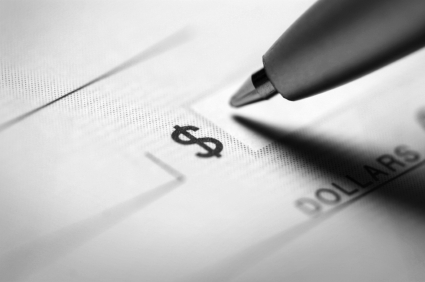Tips to Manage Your Money
I am surely not one of the greatest money managers in the world, but a few years ago, I worked as a phone banker, and I can tell you that the average person knows very little about managing their checking account. These days, with all of the “services” banks offer, a checking account has become a rather risky enterprise. Here are a few tips to help you manage your checking account wisely.
Make a Note of Every Expense
This may seem like a simple and obvious thing to do, but you would be surprised by how many people call their bank’s customer service completely baffled by being overdrawn and then admit that they keep no records at all! Whether you use your debit card or write a check, make a note of it in your checkbook every time you spend money. Note the date, name of the payee, and the amount. If it is a check, be sure to note the number. If you use your debit card, note ACH in the item column. When you document all of your expenses, you are far less likely to lose track and become overdrawn.
Avoid Using Overdraft Protection & Direct Deposit Advance (like a Payday Loan from your bank)
These two services can be very useful in the event of a true emergency, but don’t get into the habit of using them. Remember that your bank is not doing you a favor by providing these. Banks make money by charging you fees. The fees for Overdraft Protection and Direct Deposit Advance are steep. As a phone banker, I frequently spoke with customers who had become trapped in a vicious cycle of paying more and more fees each month because they had come to depend on these services. The fees ate up their paychecks, so they had to overdraw and use Direct Deposit Advance more and more.
Instead of using these services, create your own Overdraft Protection. Build yourself a little cushion in your checking account. It is easy to do. When you note your expenditures in your checkbook, make two columns. In the column immediately after your notation of where you spent your money, write the exact amount of the expense. In the column on the far right of your checkbook (where you do your figuring) round up to the next dollar. Bit-by-bit, those rounded up dollars will save in your checking account, and you will have a little extra money to protect you against overdrafts. You can increase the speed with which your cushion grows by being sure to deduct your service fees every month, even after you have a steady minimum in your checking account and these fees are not actually being charged. In essence, you are simply setting those service fees aside as savings every month.
Be careful not to come to rely on your safety cushion! Pretend it isn’t there. You will always be able to figure out exactly how much you have by comparing your two columns. When your cushion has grown significantly, you may want to transfer some of it to a CD or savings account or use it to pay off a bill, but don’t get yourself in trouble by using your safety cushion on a regular basis.
Balance Your Checkbook
This used to be a big pain in the posterior, but nowadays, with online banking it is quite easy. Actually, it is not really necessary to sit down and calculate everything all at once to make sure that it balances. It is necessary to make sure you have entered every expense (including automatic recurring expenses) in your checkbook and that the bank has charged you the right amount for each of your expenditures.
Check your account online every 2 or 3 days. Have your checkbook, a pen, and a highlighter on hand. Check the amounts the bank has listed against your own records. When an item has posted properly, highlight it in your checkbook so that you will know that item is accounted for. Be sure to write in any recurring expenses that have come into your account. Make sure that you can identify every transaction - both debits and credits. If you have questions be sure to call your bank right away.
By checking to be sure the bank is posting your debits and credits properly and knowing which items have cleared and which items are pending, you can quickly and easily compare your running balance (the one that you keep rounded up) with the bank’s balance and have a good idea of how much you have set aside for emergencies. Again, it is not a good idea to make a habit of depending upon it, but it is a good idea to have it, just in case. Building your own Overdraft Protection/emergency fund will save you money and bring you peace of mind.
Copyright:SuzanneBennett:October 14, 2009
For more on saving money, you may enjoy:
Celebrating A Green Christmas Can Keep You From Getting "In the Red"
http://www.associatedcontent.com/article/1207729/celebrating_a_green_christmas_can_keep.html?cat=74
Go as Green as You Can Affordably and Easily
http://www.associatedcontent.com/article/1749666/go_as_green_as_you_can_affordably_and.html?cat=5
Enjoying Plenty of Fruits & Veggies on a Budget
http://www.associatedcontent.com/article/2047127/enjoying_plenty_of_fruits_veggies_on.html?cat=22


